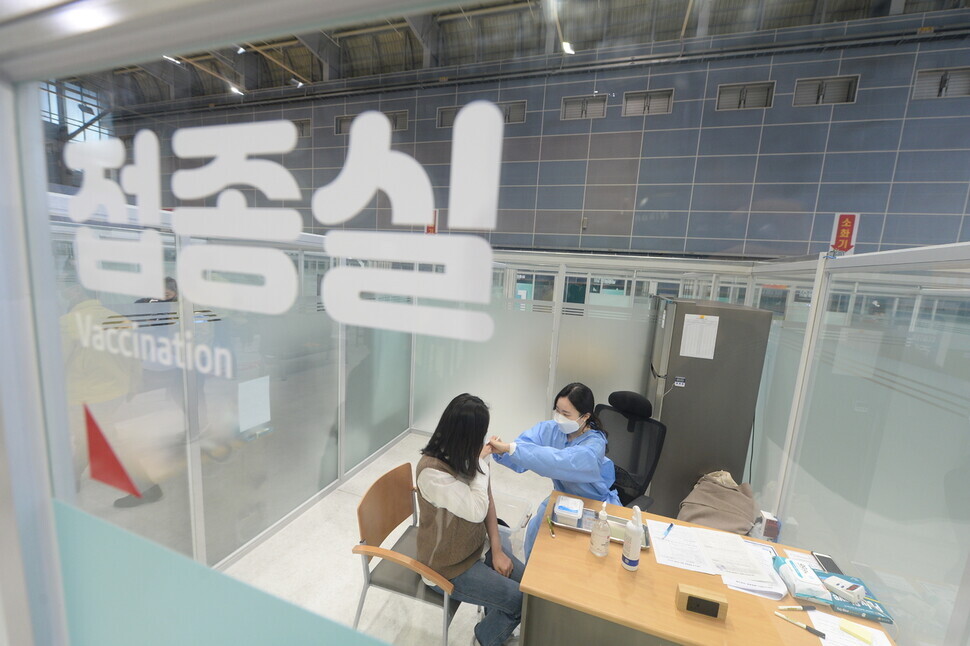hankyoreh
Links to other country sites 다른 나라 사이트 링크
Why controversy surrounding AstraZeneca vaccine has been especially heated

The COVID-19 vaccine produced by the British pharmaceutical company AstraZeneca (AZ) was touted from its development stages as a potential “game changer” thanks to its relatively affordable price and simpler storage and transport requirements.
But between that time and a European Medicines Agency announcement on March 18 verifying the vaccine’s safety — and seemingly resolving questions about blood clotting side effects — the AZ vaccine has been more of a troublemaker, with debates raging over everything from questions about its effectiveness in senior citizens to belated reporting of clinical side effects.
AZ had been a frontrunner in vaccine development, but when side effects were observed in its US clinical trials between July and September 2020, it did not report them in a timely manner to the US Food and Drug Administration. When this belatedly came to light, trust between US health authorities and the company took a hit.
The AZ vaccine received approval from the UK in late December 2020 and the European Union (EU) in late January of this year. In the US, however, it does not appear likely to be granted approval before next month due to the delays in clinical trials.
Even after the AZ vaccine was approved in Europe, question marks surrounded its effects in senior citizens. Germany, France and other EU members barred administration of the vaccine to seniors on the grounds that at just 7 percent, the proportion of clinical trial participants aged 65 or over had been too small.
Early this month, UK public health authorities analyzed outcomes for seniors who actually received the vaccine. The findings showed that its effectiveness in seniors was roughly on par with vaccines produced by Pfizer and others.
Analysts suggested three main factors to explain why the controversy surrounding the AZ vaccine has been especially heated.
In some respects, AZ brought the damaged trust on itself when it failed to report the clinical trial issues to US health authorities and used a lower proportion of senior citizen participants than either Pfizer or Moderna.
The blood clot controversy, in contrast, is more along the lines of a rite of passage — an unavoidable occurrence when vaccines are being developed with unprecedented speed.
But some observers have also pointed to political factors, including the vaccine development race between the US and UK and the post-Brexit bad blood between the UK and EU.
As a reason for delaying its AZ vaccine approval, the US has cited trust issues. But some analysts also said that amid the vaccine development race with the UK-based AZ, the US is also being “friendlier” to the US-based Pfizer and Moderna.
Additionally, the blood clot furor has also been viewed in the context of the battle over vaccine supplies between the UK and EU.
A recent study of blood clotting reactions through February by the UK Medicines and Healthcare products Regulatory Agency found 38 cases of blood clots forming in the case of the Pfizer vaccine, compared with 30 for the AZ vaccine. Observers have noted that in spite of this difference, AZ has been singled out for particular criticism.
By Kim Ji-hoon, staff reporter
Please direct comments or questions to [english@hani.co.kr]

Editorial・opinion
![[Editorial] Intensifying US-China rivalry means Seoul must address uncertainty with Beijing sooner than later [Editorial] Intensifying US-China rivalry means Seoul must address uncertainty with Beijing sooner than later](https://flexible.img.hani.co.kr/flexible/normal/500/300/imgdb/original/2024/0517/8117159322045222.jpg) [Editorial] Intensifying US-China rivalry means Seoul must address uncertainty with Beijing sooner than later
[Editorial] Intensifying US-China rivalry means Seoul must address uncertainty with Beijing sooner than later![[Column] When ‘fairness’ means hate and violence [Column] When ‘fairness’ means hate and violence](https://flexible.img.hani.co.kr/flexible/normal/500/300/imgdb/original/2024/0516/7417158465908824.jpg) [Column] When ‘fairness’ means hate and violence
[Column] When ‘fairness’ means hate and violence- [Editorial] Yoon must stop abusing authority to shield himself from investigation
- [Column] US troop withdrawal from Korea could be the Acheson Line all over
- [Column] How to win back readers who’ve turned to YouTube for news
- [Column] Welcome to the president’s pity party
- [Editorial] Korea must respond firmly to Japan’s attempt to usurp Line
- [Editorial] Transfers of prosecutors investigating Korea’s first lady send chilling message
- [Column] Will Seoul’s ties with Moscow really recover on their own?
- [Column] Samsung’s ‘lost decade’ and Lee Jae-yong’s mismatched chopsticks
Most viewed articles
- 1[Editorial] Transfers of prosecutors investigating Korea’s first lady send chilling message
- 2S. Korea “monitoring developments” after report of secret Chinese police station in Seoul
- 3[Exclusive] Unearthed memo suggests Gwangju Uprising missing may have been cremated
- 4[Editorial] Intensifying US-China rivalry means Seoul must address uncertainty with Beijing sooner t
- 5China, Russia put foot down on US moves in Asia, ratchet up solidarity with N. Korea
- 6Xi, Putin ‘oppose acts of military intimidation’ against N. Korea by US in joint statement
- 7Truth commission confirms Korean War killings by soldiers and police
- 8[Editorial] South Korean women are mobilizing in unprecedented ways
- 9Calls for gender-equality continue as demonstrations target President Moon
- 10[Column] “Hoesik” as ritual of hierarchical obedience